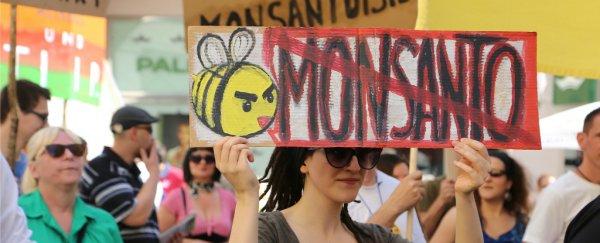Agrochemical giant Monsanto will be investigated by a tribunal of environmentalists, activists, and scientists in The Hague, Netherlands, next year, against charges of "ecocide". The citizens' trial was announced at a press conference on December 3 in Paris, to tie in with the COP21 UN Conference on Climate Change.
Calling themselves the Monsanto Tribunal, the crowd-funded group will evaluate allegations made against Monsanto with regards to damage caused to the environment and human health – but regardless of the outcome, they won't be able to sentence or charge the agriculture giant. Still, they claim the trial is more than just a symbolic act, with the larger goal of establishing 'ecocide' as a crime for the first time.
"The time is long overdue for a global citizens' tribunal to put Monsanto on trial for crimes against humanity and the environment," said Ronnie Cummins, director of the Organic Consumers Association and a founder of the Monsanto Tribunal.
"Monsanto is … largely responsible for the depletion of soil and water resources, species extinction and declining biodiversity, and the displacement of millions of small farmers worldwide," added environmental activist Vandana Shiva.
The Monsanto products under scrutiny include RoundUp – a commonly used herbicide – and genetically modified (GM) RoundUp Ready Seeds, which the tribunal claim have caused environmental damage and put financial pressure on farmers. They will also investigate a compound produced by Monsanto that was used in the chemical weapon Agent Orange.
But while many are celebrating the move, others have criticised it as a publicity and fund-raising stunt, given the fact that the tribunal isn't part of an internationally recognised court and can't actually punish the corporation.
However, the Monsanto Tribunal explains that the trial will be used to assess whether or not Monsanto could be eligible for criminal proceedings, and is the first step to prosecution in the future.
"Relying on the 'Guiding Principles on Business and Human Rights' adopted by the UN in 2011, an international court of lawyers and judges will assess the potential criminal liability of Monsanto for damages inflicted on human health and the environment," explained a press statement.
"The court will also rely on the Rome Statute that created the International Criminal Court in The Hague in 2002, and it will consider whether to reform international criminal law to include crimes against the environment, or ecocide, as a prosecutable criminal offence."
The assumption is that if the tribunal can raise enough evidence to support allegations against Monsanto, a criminal court will decide to pursue the matter further.
However, it's proven incredibly difficult to find evidence against Monsanto. Bill Nye, who used to be an outspoken GM critic, even toured the company's facilities and couldn't find anything untoward. In fact, since talking with their scientists, he's announced that he's a supporter of genetic modification in crops. Time will tell if the tribunal will have more luck.
This isn't the first time Monsanto's come under fire – several court cases have been brought against the company in the past, and Monsanto has also taken its fair share of farmers to court for using their patented seeds without paying for them.
Back in 2012, thousands of certified organic farmers started a lawsuit to prevent Monsanto from suing them in the event of pollen from the company's patented seeds ending up in their fields. But the judge dismissed the case, claiming that the allegations were "unsubstantiated".
The Monsanto Tribunal trial is scheduled 12 to 16 October 2016, with the final day falling on World Food Day.
